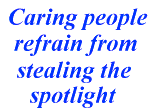"Check Your Story At The Door"
continued from Home Page
I was the hurting party with fresh bereavement. He was a veteran of long past losses. I had cracked the door of lament open, but he walked in, paying no attention to my concerns. I was the patient — instead I was being asked to become the doctor, to attend to his hurts.
It happens all the time. “John” presents to “Bill” a challenge but Bill responds by telling his story. “Jane” brings up her fear but “Betty” moves boldly onto the stage, relating her own burdens. “Sally” phones “Carole” with news, but instead, Carole seizes the opportunity to tell her own news, with little attention to what Sally had really wanted to say.
Sensitive people must bite their tongues even when they are dying to spill their own thoughts. It is the most natural thing in the world to jump over to your own memories when another’s triggers a recall of something similar.
 Stories
evoke stories. But caring people diligently refrain from stealing another’s
spotlight. They know that if “Bob” brings up either a sorrow or a joy,
Bob is asking to be heard — not to have the tables turned so that he has
to listen while you share.
Stories
evoke stories. But caring people diligently refrain from stealing another’s
spotlight. They know that if “Bob” brings up either a sorrow or a joy,
Bob is asking to be heard — not to have the tables turned so that he has
to listen while you share.
I visited “Agnes” in Memorial Hospital after her major surgery. She’d had an operation to remove a brain tumor. As I sat beside her bed, one throbbing thought was clamoring in my head — my mother’s brain tumor surgery, decades earlier. I wanted badly to tell Agnes my story. Here was a point of identification to pull us together. “See, I understand this,” my telling would prove.
Better judgment, however, kept my tongue still. This was Agnes’ dilemma for me to reach out toward, not a time for her to minister to me, as inevitably would happen. (Even mentioning my mother’s illness could not be considered. For certainly Agnes would want to know the outcome. Since my mother died of her malignant tumor, this was definitely not a tale to tell a person fresh from the operating room.)
 This
is Cardinal Rule #2 in being a caring friend: Resist mightily the strong
temptation to discontinue tuning in to another’s story in order to tell
your own.
This
is Cardinal Rule #2 in being a caring friend: Resist mightily the strong
temptation to discontinue tuning in to another’s story in order to tell
your own.
(Cardinal Rule #1 is “Show Up!”, as described in my book, 90% of Helping Is Just Showing Up.) As powerful as your similar incident might be, if another person has handed you their joy or sorrow, stay with theirs. Yours can wait.
Some partial exemptions are allowed. One who has gone through an apparently similar trial holds unique credibility. Then a quick revelation can be helpful. For instance, women anticipating breast cancer surgery find it immensely reassuring when my wife states that she’s “been there.” She then can answer questions as they arise, but she should resist all along her inner pressure to tell, in detail, how it all went. That inappropriately turns the anxious one into her support person, when it should work the other way around.
One other caveat: Even if you have traveled the identical road, try to avoid the words, “I understand how you feel.” No one does, for sure. To say, “I understand” irritates more than it helps. Similar circumstances do not mean equal responses. Everybody is different. Seek to understand the other, but resist claiming that you do. Instead, it is much more helpful to show empathy for the person’s pain (or joy) by saying something like, “You must really be hurting.”
In conclusion. After “showing up” or being there for a friend who wants to talk, or open a tender subject, give them the spotlight. Use all your energy to pay attention to their joy or concern. Save your own story for another day.
(Next time: “Naming the Elephant”, one of the most important strategies caring people must use.)
Dr. James Kok is Director of Care Ministry for the Crystal Cathedral Congregation of Garden Grove, CA. He has been an ordained minister of the Christian Reformed Church of America for 35 years. He speaks extensively throughout the United States and Canada. His hands-on work as a pastor has led to a profound understanding of the issues and dynamics of personal grief and human suffering on which he has written and spoken at length.